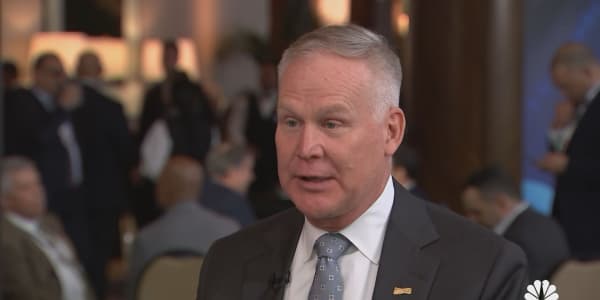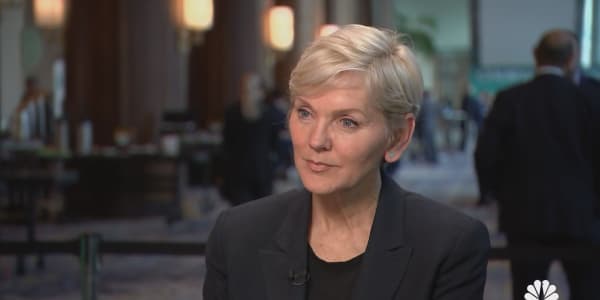The electric vehicle market is tiny, but it's created some very big questions about the future of gasoline demand.
Morgan Stanley analysts Wednesday issued a forecast for global miles driven rising to 32 trillion by 2030, up from 11 trillion currently, with emerging markets a big driver of the growth. They say that forecast is not only bullish for electric cars and light trucks, but also for gains by gasoline-fueled vehicles.
For example, they expect China, the largest and fastest adapter of electric vehicles, to increase miles traveled to nearly 9 trillion by 2040, up from 1.5 trillion currently.
"Even allowing for an aggressive penetration of EVs, we forecast gasoline demand for light vehicle transport to roughly triple by the mid-2030s before beginning a slow decline," the Morgan Stanley analysts wrote. "It's little wonder why the Chinese government is so focused on encouraging the development of a sustainable electric transport ecosystem on the grounds of energy security and environmental sustainability."
Electric cars and light trucks, including hybrids, in the last year displaced only about 50,000 barrels a day of oil in a world that is using 100 million barrels a day for the first time this year, according to IHS Markit. That's small, but energy experts say when combined with other trends, like fuel economy standards, the reduction in oil demand will start to add up.
"We have [electric vehicles] going up to be 30 percent of new car sales by 2040 from 1 percent now," said Jim Burkhard, who heads oil research and energy and mobility research at IHS Markit. Last year, he said there were 2.8 million electric cars on the road compared to 1.5 billion oil fueled vehicles, and the electric vehicles could reach 36 million by 2025.
"Each year it will impact more and more…There's no doubt about that but the bigger demand story is fuel economy. EVs on their own are not disruptive," he said. He said the fuel efficiency efforts around the world alone should result in savings of 18 million barrels a day of fossil fuels by 2040.
Disrupting a global market
Ride sharing is what could be disruptive for the traditional car market, and so could self-driving cars. When the Ubers and Lyfts of the world have a self-driving fleet, running electric cars, that will certainly make a dent in gasoline demand.
"About a third of global oil demand is from cars, and 40 percent of the growth since the year 2000 has come from cars. So what happens with cars is going to have a big impact on oil demand," said Burkhard.
In a recent report on electric vehicles and energy, the World Economic Forum said automated vehicles could ultimately be 40 percent cheaper to drive per mile than a vehicle with an internal combustion engine.
"Mobility service companies, especially with driverless technology — that's the case where electric vehicle sales could have a commercial footing," said Burkhard.
"We think the first driverless car services will start to materialize in the next year or two…It's not 10 years from now. If that grows and people accept it, and the public gets confidence in it, that will grow quite a bit in the next decade."
IHS Markit hosts the annual CERAWeek energy conference in Houston next week, and electric vehicles and the future of transportation will be a big topic. Morgan Stanley analyst Adam Jonas, who authored the report and has been bullish on Tesla for many years, will appear there on a panel.
The Morgan Stanley analysts said they believe the amount of miles driven globally will rise so much because the costs of driving will drop due to shared mobility and automated technologies.

"Our conviction in the growth in miles 'pie' offers room to be constructive on EV penetration while allowing for continued growth in global gasoline demand deep into the 2030s," they wrote.
Future prospects
According to IHS, 2035 U.S. cars will continue to lag Europe and China in terms of fuel efficiency. By 2035, U.S. vehicles will get 29.1 miles to the gallon compared to China's 41.7 mpg. U.S. drivers will be covering 3.5 trillion miles that year, with 161 billion miles from ride hailing. In China, drivers will be driving 2.9 trillion miles with 485 billion from ride hailing.
Burkhard said global oil demand is expected to average 100 million barrels a day for the first time this year, up from 98.2 million barrels a day on average last year. Demand is expected to grow by 1.9 million barrels a day, up from 1.8 million barrels a day last year, but growth is peaking and it should be about 1.6 million barrels a day next year.
But overall demand could peak at about 113 billion million barrels a day by the mid-2030s and then begin to slope down in 2040.
"About a third of global oil demand is from cars, and 40 percent of the growth since the year 2000 has come from cars. So what happens with cars is going to have a big impact on oil demand," Burkhard
Bank of America Merrill Lynch recently predicted that the impact of electric vehicles will start showing up in the oil market in the next decade. BofA analysts say they expect oil demand to stay strong through 2020, expanding at an annual rate of 1.3 million barrels a day. Growth in demand would then slows down quickly in the 2021-23 period to just 800,0000 as the effect of electric vehicles starts to show up.
Francicso Blanch, head of BofAML global commodity and derivatives research, said he expects the global trend toward fuel savings to be driven in part by the commitment to reduce carbon, especially by countries in Europe and by China.
"I think just naturally China has a very strong inclination for EVs for a number of reasons. One of these is obviously carbon commitment but then there is the environmental pollution locally which is exasperated by internal combustion engines," Blanch said. "China has become the world's largest oil importer a few years ago."
Dan Pickering, co-president of Tudor, Pickering, Holt and Co and CIO, said the electric vehicle and ride sharing phenomena should flatten out global oil demand by the mid-2030s.
"Everybody's got a prognostication on when oil's going to peak. My view is 2035. I view it as more of a plateau than a peak," he said. "I think the way you get there is through massive efficiencies and electric vehicles. The mandates don't start happening until then globally. It's hard to how it happens much faster than that unless there's some crazy economic slowdown or some major technological breakthrough."





